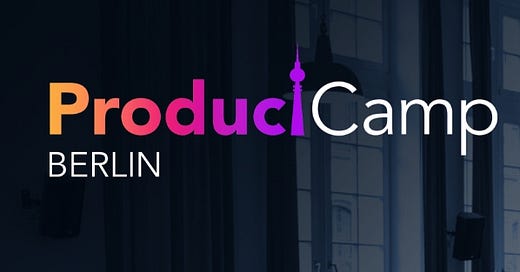Have to say, this year was different. It has been my third year ( 2nd as a volunteer) and the vibe was surprisingly different.
If I were to compare this year's ProductCamp to a season, it would undoubtedly be autumn - full of hope and forced positivity, but with an undercurrent of worry. Winter, metaphorically speaking, is coming.
As I manned the registration desk, I had the opportunity to observe nearly all 300 attendees. While I didn't attend many sessions, I gained valuable insights from simply watching and interacting with the participants.
The atmosphere was noticeably different this year. Attendees seemed more focused and serious, maintaining a professional demeanor that felt somewhat forced. In conversations throughout the event, it became clear that many were either recovering from recent layoffs or anxiously anticipating potential job cuts. The recession's impact was evident, particularly when discussing the rising cost of living in Berlin - a city not really known for its affordability, especially considering Germany's substantial tax rates.
Some participants expressed frustration with their current roles but felt compelled to stay due to the scarcity of opportunities elsewhere. This sentiment reflects a broader trend in the tech industry, where job security has become a primary concern for many professionals.
The unprecedented scale of ghost jobs is staggering.
You know those enticing job listings that seem too good to be true? Spoiler alert: they probably are. Unscrupulous executives and HR departments are flooding the market with these undead job offers, preying on the desperate and the ambitious alike. But why, you ask? Well:
Some companies are treating your job applications like an all-you-can-eat data buffet. They're not hiring; they're harvesting your personal information, skills, and market insights. It's not a job offer; it's a phishing expedition with a corporate letterhead.
Others defend this practice as "pipeline building." They're keeping these phantom positions on life support, hoping to snag top talent when budget magically materializes. Newsflash: in this economy, that's like waiting for pigs to fly – first class.
Some firms are using these ghost jobs to catfish investors and clients. "Look at all these open positions! We must be growing!" Nope, they're dying, and these fake job listings are their last gasp for relevance. It's Gogol's 'Dead Souls' for the corporate world – you can literally buy the illusion of growth.
Some sadistic HR departments are using these non-existent jobs as psychological warfare against their own employees. By dangling these fake opportunities, they're sending a clear message to their current workforce: "Stay put, shut up, and be grateful." It's a twisted way of saying, "Look how many people want your job – we can replace you in a heartbeat."
This year's ProductCamp marked a noticeable departure from previous editions. While past events struck a balance between feel-good presentations and practical PM skills, 2023 veered heavily towards soft skills and self-improvement.
The democracy of topic selection at ProductCamp typically reflects the pulse of EMEA's product community. This year's lineup suggests a priority shift towards emotional well-being, communication, and seeking appreciation. Technical sessions were sparse, to say the least.
As a long-time attendee, I found myself yearning for more substance. While soft skills are valuable, they can't replace the hard skills that ultimately drive results. The scarcity of sessions on A/B testing, machine learning, and technical subjects was disappointing.
However, as the content is democratically chosen, we must acknowledge that this year's focus reflects the current desires of the product management community.
Is this shift a temporary trend or a sign of changing priorities in our field? Only time will tell.
This year, we changed our approach to planning. Gone are the days of scribbling topics on scraps of paper (2023, 2022). Remember when we'd choose sessions based on the presenter's energy rather than content? (I still recall seeking out that woman from idealo, knowing she'd dish out juicy insights on their large-scale A/B testing.) Now, we've gone digital. Speakers got a heads-up with our shared planner, allowing for more polished presentations. But here's the kicker: while session quality skyrocketed, we lost that raw, spontaneous edge. Some talks felt almost too structured, even transactional. Hell, a few speakers were blatantly headhunting or chasing clients. Progress? Maybe.
These notes have been collecting dust, and I've finally found a moment to share them. The unconference this year left me with conflicting emotions. Would I feel justified shelling out 75 EUR for a ticket? I'm not convinced.
In this economic downturn, it's the battle-hardened professionals with concrete skills who'll weather the storm and emerge victorious. No one's got time for smooth talkers who can't deliver beyond their probation period. When times get tough, soft skills take a backseat. It's hard to shake this slightly jaded perspective on last month's event.
This year's unconference was a different beast altogether. While I connected with some intriguing individuals, the sessions failed to ignite any sparks of inspiration. Next year maybe? I don’t know.



